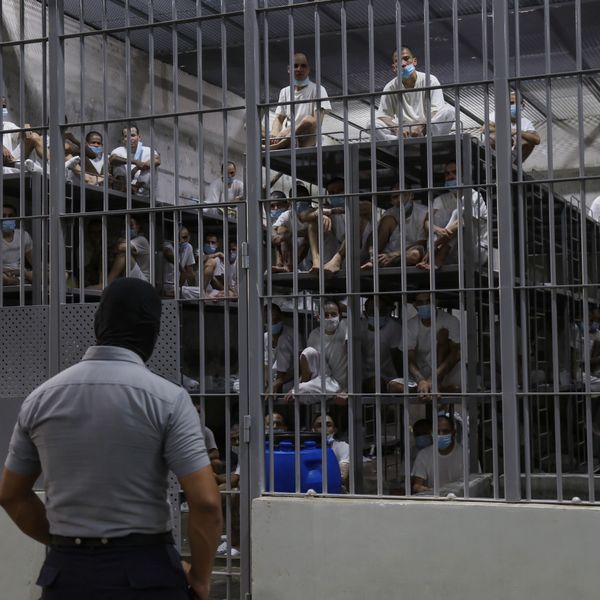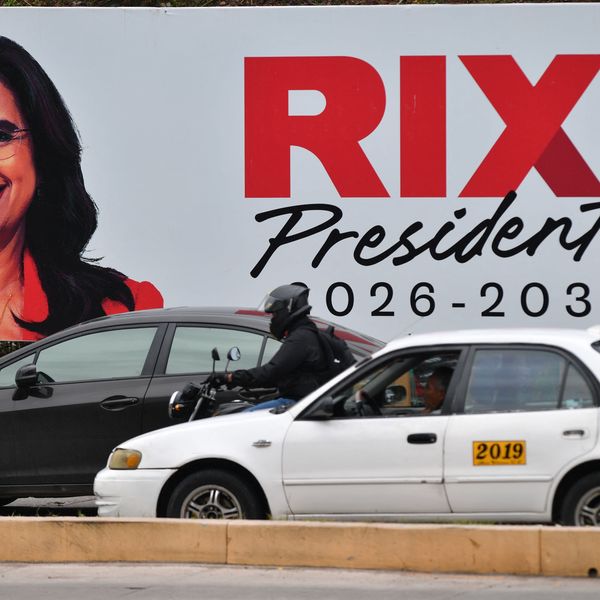Honduras Human Rights Abuses Worse One Year After President Lobo Took Office
In recent remarks on U.S.-Latin American relations made at the Brookings Institute, Arturo Valenzuela, a State Department official with responsibility for the region, commented that Honduras, two years removed from a coup that U.S. officials on the ground called illegal, had "made significant progress in strengthening democratic governance...[and] promoting national reconciliation..." Viewing the situation on the ground here in Honduras, one can only wonder where the Assistant Secretary is getting his information.
In recent remarks on U.S.-Latin American relations made at the Brookings Institute, Arturo Valenzuela, a State Department official with responsibility for the region, commented that Honduras, two years removed from a coup that U.S. officials on the ground called illegal, had "made significant progress in strengthening democratic governance...[and] promoting national reconciliation..." Viewing the situation on the ground here in Honduras, one can only wonder where the Assistant Secretary is getting his information. In fact, as President Porfirio Lobo Sosa approaches the anniversary of his first year in office, the reverse is true. Gross violations of human rights directed against activists, opposition leaders and journalists reveal a government that is far removed from democracy and a nation that is far from reconciling.
Only two days after Valenzuela's remarks, a resistance leader named Juan Chinchilla was abducted at gunpoint by masked men in police and military uniforms. After suffering two days of being burned, beaten and interrogated he was able to escape in the night. In an interview after his kidnapping, Chinchilla stated that his interrogators had numerous surveillance photos of himself and other resistance leaders. Indeed, reports of political murders, kidnappings and torture are common here and resistance leaders report constant surveillance. While there are no official counts, we have learned of 36 activists and leaders murdered since Lobo took office. At least 50 other people were killed in political violence for simply in the wrong place at the wrong time. In addition, the Inter-American Commission on Human Rights reports it received information that the children of anti-coup forces were being kidnapped, attacked and threatened as a strategy to silence the resistance.
Unprecedented violence against journalists is not an indicator of democratic governance and reconciliation. According to the Committee to Protect Journalists (CPJ), eight journalists were killed in the first half of Lobo's first year in office, prompting Reporters Without Borders to name Honduras the most dangerous country in the world for journalists.
Another disturbing development in the wake of the coup has been an increase of violence directed against LGBT activists, many of whom are associated with the opposition to the coup and have played a vital organizing role in the resistance. The pattern is continuing in 2011. The International Gay and Lesbian Human Rights Commission reported that since the beginning of January three transgendered people were murdered. Since Pam has been in Honduras two more murders of members of the LGBT community have been reported.
In the midst of this escalating political violence, Assistant Secretary Valenzuela's blithe comment is disturbingly dissonant. Rather than provide cover for the regime the State Department should use its influence to consistently and publically denounce politically motivated violence and the systematic violation of human rights and, as thirty members of Congress requested of the administration last October, they must cut off U.S. assistance to Honduran authorities, particularly the police and military. Then, maybe, we can talk about "progress" in Honduras.
An Urgent Message From Our Co-Founder
Dear Common Dreams reader, The U.S. is on a fast track to authoritarianism like nothing I've ever seen. Meanwhile, corporate news outlets are utterly capitulating to Trump, twisting their coverage to avoid drawing his ire while lining up to stuff cash in his pockets. That's why I believe that Common Dreams is doing the best and most consequential reporting that we've ever done. Our small but mighty team is a progressive reporting powerhouse, covering the news every day that the corporate media never will. Our mission has always been simple: To inform. To inspire. And to ignite change for the common good. Now here's the key piece that I want all our readers to understand: None of this would be possible without your financial support. That's not just some fundraising cliche. It's the absolute and literal truth. We don't accept corporate advertising and never will. We don't have a paywall because we don't think people should be blocked from critical news based on their ability to pay. Everything we do is funded by the donations of readers like you. Will you donate now to help power the nonprofit, independent reporting of Common Dreams? Thank you for being a vital member of our community. Together, we can keep independent journalism alive when it’s needed most. - Craig Brown, Co-founder |
In recent remarks on U.S.-Latin American relations made at the Brookings Institute, Arturo Valenzuela, a State Department official with responsibility for the region, commented that Honduras, two years removed from a coup that U.S. officials on the ground called illegal, had "made significant progress in strengthening democratic governance...[and] promoting national reconciliation..." Viewing the situation on the ground here in Honduras, one can only wonder where the Assistant Secretary is getting his information. In fact, as President Porfirio Lobo Sosa approaches the anniversary of his first year in office, the reverse is true. Gross violations of human rights directed against activists, opposition leaders and journalists reveal a government that is far removed from democracy and a nation that is far from reconciling.
Only two days after Valenzuela's remarks, a resistance leader named Juan Chinchilla was abducted at gunpoint by masked men in police and military uniforms. After suffering two days of being burned, beaten and interrogated he was able to escape in the night. In an interview after his kidnapping, Chinchilla stated that his interrogators had numerous surveillance photos of himself and other resistance leaders. Indeed, reports of political murders, kidnappings and torture are common here and resistance leaders report constant surveillance. While there are no official counts, we have learned of 36 activists and leaders murdered since Lobo took office. At least 50 other people were killed in political violence for simply in the wrong place at the wrong time. In addition, the Inter-American Commission on Human Rights reports it received information that the children of anti-coup forces were being kidnapped, attacked and threatened as a strategy to silence the resistance.
Unprecedented violence against journalists is not an indicator of democratic governance and reconciliation. According to the Committee to Protect Journalists (CPJ), eight journalists were killed in the first half of Lobo's first year in office, prompting Reporters Without Borders to name Honduras the most dangerous country in the world for journalists.
Another disturbing development in the wake of the coup has been an increase of violence directed against LGBT activists, many of whom are associated with the opposition to the coup and have played a vital organizing role in the resistance. The pattern is continuing in 2011. The International Gay and Lesbian Human Rights Commission reported that since the beginning of January three transgendered people were murdered. Since Pam has been in Honduras two more murders of members of the LGBT community have been reported.
In the midst of this escalating political violence, Assistant Secretary Valenzuela's blithe comment is disturbingly dissonant. Rather than provide cover for the regime the State Department should use its influence to consistently and publically denounce politically motivated violence and the systematic violation of human rights and, as thirty members of Congress requested of the administration last October, they must cut off U.S. assistance to Honduran authorities, particularly the police and military. Then, maybe, we can talk about "progress" in Honduras.
In recent remarks on U.S.-Latin American relations made at the Brookings Institute, Arturo Valenzuela, a State Department official with responsibility for the region, commented that Honduras, two years removed from a coup that U.S. officials on the ground called illegal, had "made significant progress in strengthening democratic governance...[and] promoting national reconciliation..." Viewing the situation on the ground here in Honduras, one can only wonder where the Assistant Secretary is getting his information. In fact, as President Porfirio Lobo Sosa approaches the anniversary of his first year in office, the reverse is true. Gross violations of human rights directed against activists, opposition leaders and journalists reveal a government that is far removed from democracy and a nation that is far from reconciling.
Only two days after Valenzuela's remarks, a resistance leader named Juan Chinchilla was abducted at gunpoint by masked men in police and military uniforms. After suffering two days of being burned, beaten and interrogated he was able to escape in the night. In an interview after his kidnapping, Chinchilla stated that his interrogators had numerous surveillance photos of himself and other resistance leaders. Indeed, reports of political murders, kidnappings and torture are common here and resistance leaders report constant surveillance. While there are no official counts, we have learned of 36 activists and leaders murdered since Lobo took office. At least 50 other people were killed in political violence for simply in the wrong place at the wrong time. In addition, the Inter-American Commission on Human Rights reports it received information that the children of anti-coup forces were being kidnapped, attacked and threatened as a strategy to silence the resistance.
Unprecedented violence against journalists is not an indicator of democratic governance and reconciliation. According to the Committee to Protect Journalists (CPJ), eight journalists were killed in the first half of Lobo's first year in office, prompting Reporters Without Borders to name Honduras the most dangerous country in the world for journalists.
Another disturbing development in the wake of the coup has been an increase of violence directed against LGBT activists, many of whom are associated with the opposition to the coup and have played a vital organizing role in the resistance. The pattern is continuing in 2011. The International Gay and Lesbian Human Rights Commission reported that since the beginning of January three transgendered people were murdered. Since Pam has been in Honduras two more murders of members of the LGBT community have been reported.
In the midst of this escalating political violence, Assistant Secretary Valenzuela's blithe comment is disturbingly dissonant. Rather than provide cover for the regime the State Department should use its influence to consistently and publically denounce politically motivated violence and the systematic violation of human rights and, as thirty members of Congress requested of the administration last October, they must cut off U.S. assistance to Honduran authorities, particularly the police and military. Then, maybe, we can talk about "progress" in Honduras.

